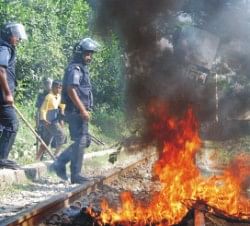Letters
A Bad Example
The Government has mandated private television channels to broadcast BTV's (Bangladesh Television) news and this raises some questions about how fair this interference is in terms of freedom of the media. It is generally known that the BTV news is partial towards the government and of very low quality and for this the programmes have a limited number of viewers. In a competitive market, we expect the different TV channels to come up with news broadcasts and shows of excellent quality and this decision made by the government pulls the BTV out of this competitive market, giving it an unfair monopoly. It gives BTV broadcasters no motivation to improve the quality of their work in the future. It is also unfair for the viewers to have to stomach bad news casting when they are paying for and expecting better quality programmes. How is it logical or even legal for the government to choose what type of news the citizens should have access to? In what is supposed to be a democratic society, this seems nothing short of a bad joke.
Badruddoza Jewel
University of Chittagong
Open pit mining and ecological hazards
 It is very obvious according to various survey and analysis of specialists that open pit mining in our country is dangerous for food production, water resources, fuel resources and public life, and in a word it is an anti-people move. To understand this issue more clearly its effects have been described below:
It is very obvious according to various survey and analysis of specialists that open pit mining in our country is dangerous for food production, water resources, fuel resources and public life, and in a word it is an anti-people move. To understand this issue more clearly its effects have been described below:
1. Scarcity of drinking and irrigation water will increase day by day. North Bengal is fully dependent on inland water. In an open coal mining system, mines should be kept dry. So 50-80 crore-litres of water needs to be released by installing 1200 pumps. Desertisation may occur due to excessive dryness. So crop cultivation and everyday life will be hampered dangerously. Released water may become sulferised and acidic. This water will be dispersed in rivers, ponds, lakes and other water bodies and cause environment pollution.
2. The triple cropped land of mining areas will be destroyed as a result of depleting water levels. Agricultural work and food production will also be hampered. Water pollution will be harmful for aquatic life and the whole ecosystem will be affected.
3. People living in mining areas will lose their cultivable land, and will become homeless.
Because of these problems many countries have stopped open pit mining. In Ecuador and Costa Rica, open pit mining has been abolished. Peru has stopped gold mining.
But multinational companies are still trying to set up open pit mining in many countries. Bangladesh is one of them. So our government has to come forward to take necessary steps and stop this from happening. Otherwise we may be faced with ecological hazards, scarcity of food, scarcity of pure drinking water, and destruction of bio-diversity.
Md Abu Bakar Siddique (Sohel)
Jagannath University
Dhaka
Mobiles on the Street
Dhaka is a busy city with streets bustling with people, especially pedestrians. It has become a common sight nowadays to see people driving cars and motorbikes while talking on their cell phones, often holding them to their ears using their shoulders as support. It makes one wonder how safe it is to do this while behind the wheel. Phone conversations can often be distracting and it can be unsafe for both the pedestrians and the drivers. This does not bother the traffic police and it is not surprising considering how much they have to deal with. It is high time that the authorities take measures to make talking on the cell phone illegal for the safety of the citizens.
Kamal Hossain
Kadirgonj, Rajshahi
Gambling
Different forms of gambling can be seen on the roads, usually close to slums and railway roads. I have recently seen one form of it the other day while walking along the railway lines. It was a three cards game using two colours, two black and one red. The gambler who conducts it plays for two black cards and the player for the red one. The system of the game is that the conductor tactfully shuffles the three cards and sets them down face up, if any of the players can guess which one the red card is, they win the money, mobiles, watches and other things belonging to the other players. The reality is that an individual can hardly go home a winner because he is encouraged to play more everytime he wins and his greed takes over his common sense and he ultimately loses it all.
My aim is not to elucidate this particular form of gambling, but to show how the gambler deceives passers-by and common people. The gamblers (6-7 persons) remain scattered from the place where the game is arranged and they come to the conductor frequently, every few minutes, and pretend to be pedestrians during the rest of the time. They play among themselves to show the passer-by that the conductor is losing, in order to entice the passers- by to join the game. The common people are easily roped in and lose everything.
I was shocked when I discovered their trick, and they failed to convince my friend and myself to join in their game. Every afternoon when the police patrol the area, the gamblers scatter, only to resume their game after the police have left. Sometimes, the law enforcing officers themselves are corrupt and encourage these activities in order to profit from them. I urge the law enforcing agencies to look into this matter and put a stop to it immediately.
Md Mohin Uddin Mizan
University of Chittagong
A Request
 |
Photo: Star File |
Once again one of the well-known political parties, BNP called a hartal on 30 November 2010. According to them this is a protest against the government. They say that they called the hartal thinking about the sorrows and sufferings of the people of Bangladesh. But at the same time it also raises questions among the people about whether a hartal is the best way to find solutions to their problems. We have seen in the past that hartal only increases sufferings in our lives. If the opposition really cares about the citizens and wants to make a statement of protest, they can do so in the parliament in a systematic way. On the other hand, it is the government's duty to listen to the opposition so hartals do not inconvenience us in the future, this is a democracy after all. I am not favouring any of the political parties. I just want to say that a mutual understanding between the government and the opposition will benefit the citizens the most and allow them to lead a hazard free life.
Md Foyjul Islam
Khilkhet, Dhaka
Submission Guideline:
Letters to the Editor, Star Diary and Write to Mita, with the writer's name and address, should be within 200 words. All articles should be within 1,200 words. A cover letter is not necessary, but every write-up should include the writer's name, phone number and email address (if any). While The Star welcomes unsolicited articles and photographs, it cannot accept the responsibility of their loss or damage. The Star does not return unsolicited articles and photos. Response time for unsolicited write-ups ranges from three weeks to two months. All articles submitted are subject to editing for reasons of space and clarity.
All materials should be sent to: The Star magazine, 19 Karwan Bazar, Dhaka-1215, Fax: 880-2-8125155 or emailed to: <[email protected]>
It is recommended that those submitting work for the first time to The Star take a look at a sample copy beforehand. Our website is: http://www.thedailystar.net/magazine
Copyright (R) thedailystar.net 2010
